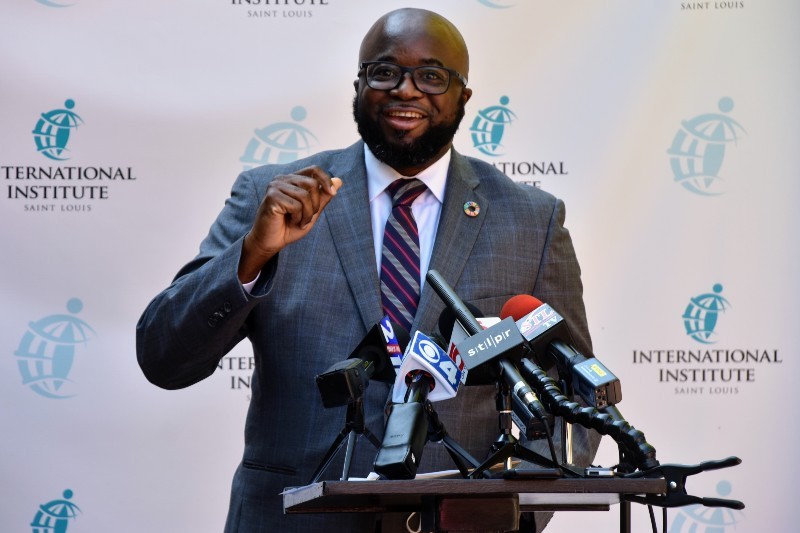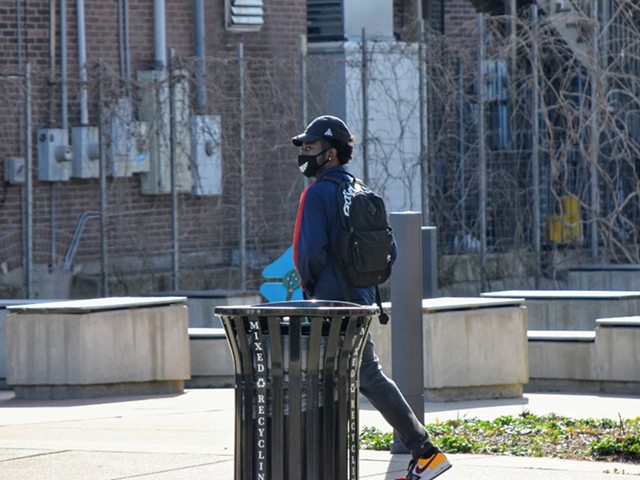
DOYLE MURPHY
Arrey Obenson, president of the International Institute, says St. Louis has capacity to resettle at least 1,000 Afghans fleeing the Taliban.
As Afghans flee a Taliban takeover at home, St. Louis officials hope they'll land here.
"We're ready to welcome Afghan citizens to the Gateway City with open arms and open hearts," St. Louis Mayor Tishaura Jones says.
Jones spoke this morning at a news conference at the International Institute of St. Louis alongside speakers representing the county government, regional business community, military veterans and immigrants who've found a home in the region.
In recent days, local leaders have pushed hard to position the city as a destination for at least a thousand of the tens of thousands of people leaving and trying to leave Afghanistan. Jones and St. Louis County Executive Sam Page released a joint statement on Wednesday in support of accepting the newcomers. St. Louis is one of nineteen cities across the United States in the running to accept a portion of the influx of Afghans.
Most of the focus has been on Afghans who have Special Immigrant Visas, or SIVs. SIV holders worked with American troops in support of the U.S. mission, often serving as interpreters, in clerical roles and even fighting alongside American soldiers. In twenty years of war, that support network swelled, and there are believed to be nearly 21,000 SIV holders. The number multiplies when their families are included, with estimates of 70,000 to 80,000 hoping to escape the wrath of Taliban forces.
Arrey Obenson, president of the International Institute, says the process of resettling the new wave of Afghans is already underway.
"It's not when," he says. "We're already having arrivals."
About 50 have come this year, according to Obenson, but they are not the first. Since 2010, the International Institute has resettled 626 Afghan citizens. About half have been SIV holders. Pete Lucier, a St. Louis native who served as a Marine in Afghanistan and is now a Saint Louis University law student, spoke this morning of working alongside Afghan interpreters, whom he described as essential to U.S. efforts.
"America owes these people a debt for what they did for me, for my brothers and sisters who served in Afghanistan," he says. "Veterans, specifically, owe those who are coming here a debt for everything that they did for us. They patrolled alongside us. They sweated with us. When it came to it, they would grab weapons and shoot back at the enemy with us. And sometimes, they died with us."
Each fiscal year, the federal government determines the number of refugees and SIV holders who will be allowed into the country. As the RFT previously reported in a November 2019 cover story, the Trump administration's anti-immigrant and anti-refugee policies largely choked off the pipeline and dismantled much of the infrastructure used to move people through the time-consuming process of background checks and paperwork. But the numbers are still expected to increase in the coming year, and the International Institute hopes for large numbers of Afghans.
Blake Hamilton, vice president of programs for the International Institute, tells the RFT in a phone interview that the pace of resettlement has quickened with the crisis in Afghanistan. In normal times, their team would have seven to ten days' notice of arrivals, time which they used to find housing and set up other supports. Now, the notice is about 24 hours.
"This is not normal, not normal circumstances," he says.
To fill the need, they've worked with partner organizations and local government. Jones says the city is following the International Institute's lead as to what support is needed. She noted that President Biden's administration has earmarked $500 million to help cities resettle SIV holders and says her administration is looking at whether that could help in St. Louis.
For St. Louis leaders, part of the work has been in framing the message to residents. At this morning's press conference, speakers made a point of highlighting the benefits to the region of welcoming SIV holders, who tend to be educated professionals, including lawyers, accountants and clerical workers who were needed to support the U.S. efforts.
And St. Louis leaders have drawn on the example of Bosnian refugees who flocked to the city in the 1990s. The story of the Bosnians, who helped reshape struggling south city neighborhoods by starting businesses and redeveloping dilapidated housing, is now seen as a huge success for St. Louis. The International Institute and Catholic Charities directly resettled about 11,000 Bosnians fleeing slaughter in their country, and that number multiplied five to seven times, depending on the estimate.
But as warmly as St. Louis now remembers the arrival of Bosnians, there wasn't immediate acceptance. In the early years, neighborhood groups complained about the newcomers, launching missives about outdoor smokers and speeding Bosnian teens. St. Louis leaders seem to be working to head off similar resistance to Afghans, emphasizing the statistically high tendency of foreign-born residents to start new businesses and the need to attract new people in a city where the population continues to decline.
"After decades of loss, I want our city to grow," Jones says, "and that means laying out the welcome mat for those who want to build a better life for themselves and their families here."
One of this morning's speakers, an Afghan man who arrived in the U.S. in 2014 through an SIV, says he's found St. Louis to be a welcoming place. He ran a small market here that eventually went under during the pandemic and now works in IT for the International Institute.
He says he was "shocked" by the speed of the Taliban's takeover, and he worries about family left behind. He asked that we not publish his name, because he's concerned relatives will face retribution. The man refers to the forces now in control of his native country as "the dark regime" and says the Taliban's recent attempts to present a more civil face to the world is a front that will dissipate in the coming weeks.
"Overall, the dark regime has not changed," he says. "It has become more brutal."
We welcome tips and feedback. Email the author at [email protected] or follow on Twitter at @DoyleMurphy.





